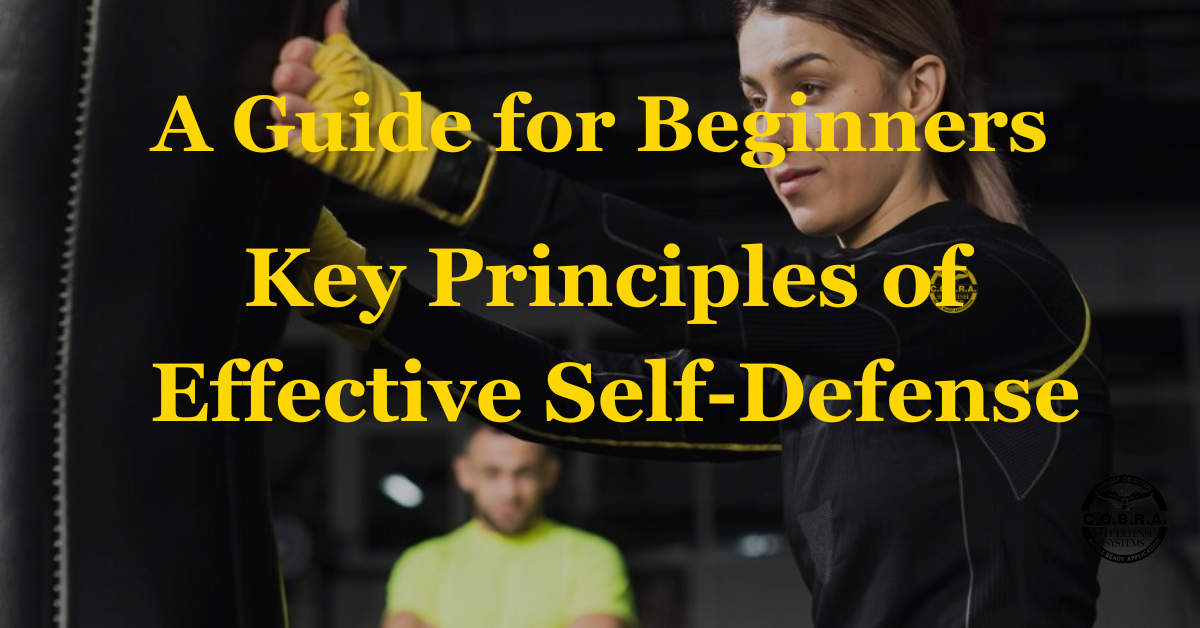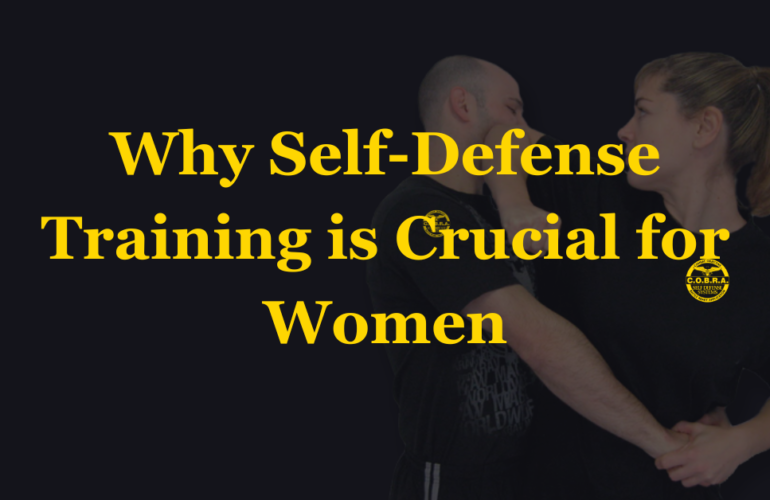Self-defense is not just a skill; it’s a mindset and a way of life. In a world where uncertainties exist, learning the key principles of effective self-defense becomes paramount, especially for beginners. This guide, tailored for the C.O.B.R.A.™ Self-Defense Pensacola community, aims to empower individuals with the knowledge and skills needed to navigate the nuances of self-defense.
I. Introduction
Embarking on the journey of self-defense requires understanding its significance in our daily lives. It’s not about living in constant fear but rather being prepared and confident in the face of potential threats. In this guide, we will delve into the core principles that define effective self-defense, with a focus on beginners.
II. Understanding the Basics
Definition of Self-Defense
Self-defense goes beyond physical combat; it involves protecting oneself from harm and ensuring personal safety. It encompasses a range of strategies, both physical and mental, designed to thwart or escape potential dangers.
Legal Aspects and Rights
Before diving into self-defense techniques, it’s crucial to comprehend the legal implications. Knowing your rights and understanding the laws surrounding self-defense is fundamental to making informed decisions in critical situations.
Common Misconceptions
Dispelling myths about self-defense is essential for beginners. It’s not about becoming a martial arts expert overnight but adopting a practical and effective approach that suits your lifestyle.
III. The C.O.B.R.A.™ Approach

Introduction to C.O.B.R.A.™ Self-Defense
C.O.B.R.A.™ Self-Defense Pensacola stands out as a comprehensive system tailored for real-world scenarios. It emphasizes simplicity and efficiency, making it an ideal choice for beginners seeking practical solutions.
Core Principles of C.O.B.R.A.™
The C.O.B.R.A.™ approach centers around awareness, preparedness, and using instinctual responses. Understanding and internalizing these principles form the foundation of effective self-defense.
How It Differs from Traditional Methods
C.O.B.R.A.™ distinguishes itself from traditional self-defense methods by focusing on real-life situations and the psychological aspects of confrontation. It’s not just about physical strength but about outsmarting potential threats.
IV. Building Physical and Mental Resilience
Physical Fitness and Self-Defense
A physically fit body is more resilient in stressful situations. This section explores the correlation between physical fitness and the ability to execute self-defense techniques effectively.
Mental Preparation and Awareness
Self-defense begins in the mind. Cultivating mental resilience and situational awareness are integral aspects of preparing for potential threats.
V. Practical Techniques for Beginners
Simple and Effective Moves
For beginners, mastering a few basic yet potent moves can make a significant difference. We’ll explore uncomplicated techniques that anyone can learn and apply.
Using Everyday Objects for Defense
Incorporating everyday objects into self-defense adds a layer of practicality. Learn how common items can become powerful tools in protecting yourself.
Importance of Repetition in Training
Repetition is the key to ingraining self-defense techniques into muscle memory. We’ll discuss the importance of consistent practice for proficiency.
VI. Developing Situational Awareness
Understanding Your Surroundings
Being aware of your surroundings is crucial for avoiding potential threats. Learn how to assess and navigate different environments effectively.
Recognizing Potential Threats
Identifying potential threats early allows for proactive measures. This section provides insights into recognizing signs of danger and taking preemptive actions.
Staying Alert Without Paranoia
Balancing awareness with a healthy mindset is essential. Discover how to stay vigilant without succumbing to unnecessary fear or paranoia.
VII. Choosing the Right Self-Defense Tools
Overview of Self-Defense Tools
Explore the variety of self-defense tools available in the market. From pepper sprays to personal alarms, understanding your options is vital.
C.O.B.R.A.™ Self-Defense Pensacola’s Recommendations
Get insights into the recommended self-defense tools by C.O.B.R.A.™ Self-Defense Pensacola and understand the rationale behind these choices.
Legal Considerations When Carrying Tools
Before arming yourself with self-defense tools, know the legal implications. This section provides a comprehensive guide to navigating legal considerations.
VIII. Training Programs for Beginners
Importance of Structured Training
Structured training programs provide a systematic approach to learning self-defense. Discover the benefits of enrolling in programs tailored for beginners.
C.O.B.R.A.™ Self-Defense Pensacola’s Beginner-Friendly Programs
Explore the specifically designed programs for beginners offered by C.O.B.R.A.™ Self-Defense Pensacola, focusing on gradual skill development.
IX. Real-life Success Stories
Narratives of Individuals Who Utilized Self-Defense Effectively
Real-life success stories inspire and educate. Read about individuals who successfully applied self-defense principles and learn valuable lessons from their experiences.
Lessons Learned from These Experiences
Analyzing the lessons derived from real-life scenarios enhances our understanding of effective self-defense strategies.
X. Addressing Common Challenges
Overcoming Fear and Hesitation
Fear can be a significant barrier to effective self-defense. Explore practical ways to overcome fear and hesitation in confrontational situations.
Dealing With Physical Limitations
Self-defense is inclusive. Discover adaptive techniques for individuals with physical limitations, ensuring everyone can benefit from these principles.
Staying Consistent With Training
Consistency is key in mastering self-defense. This section offers tips and motivation to maintain a regular training routine.
XI. Integrating Self-Defense Into Daily Life
Making Self-Defense a Habit
Transform self-defense into a habit rather than an occasional practice. Discover ways to seamlessly integrate self-defense principles into your daily life.
Encouraging a Community Approach to Safety
Safety is a collective responsibility. Learn how fostering a community approach to self-defense enhances overall safety for everyone.
Involving Family and Friends
Building a network of support is crucial. Explore how involving family and friends in self-defense activities creates a safer environment for everyone.
XII. Frequently Asked Questions (FAQs)
Providing Quick Answers to Common Queries
Answering common questions ensures readers have a comprehensive understanding of self-defense principles.
Ensuring Clarity and Understanding for Readers
Clarity is essential in addressing FAQs. Each response aims to provide straightforward and easily digestible information for readers.
XIII. Conclusion
In conclusion, effective self-defense is a combination of knowledge, awareness, and practical skills. By embracing the principles outlined in this guide, beginners can embark on a journey towards personal safety with confidence.
XIV. Unique FAQs
- Q: Can self-defense be learned quickly?
- A: While basic techniques can be learned relatively quickly, mastery requires consistent practice over time.
- Q: Are self-defense tools legal everywhere?
- A: Laws vary, so it’s essential to research and understand local regulations before carrying any self-defense tools.
- Q: Is self-defense only for physical threats?
- A: No, self-defense includes mental preparedness and awareness, making it applicable to various situations.
- Q: How can I encourage my family to adopt self-defense practices?
- A: Lead by example and emphasize the collective responsibility of safety within the family.
- Q: Can self-defense training boost confidence outside of confrontational situations?
- A: Yes, the mental and physical discipline gained from training often translates into increased overall confidence.





